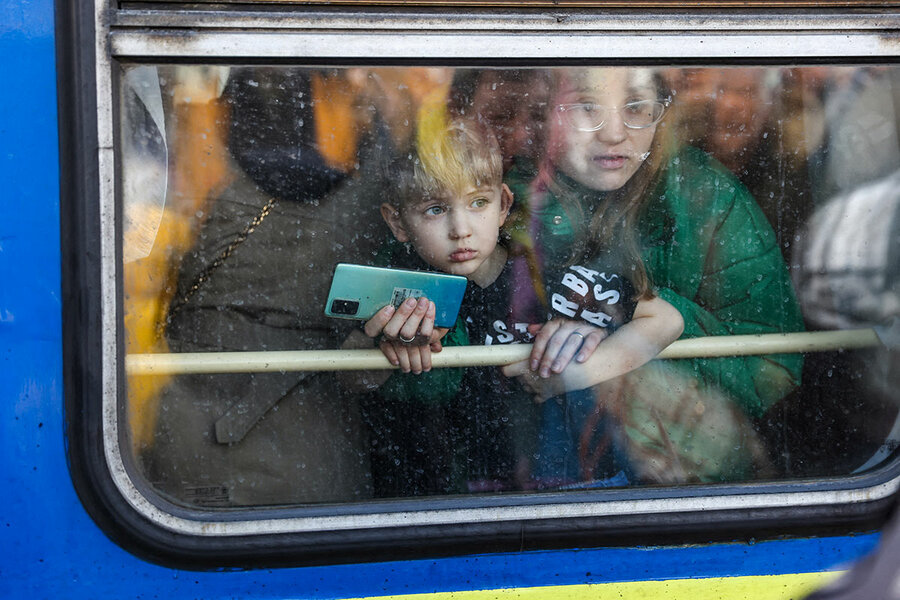Find safety or defend home? No easy choices in besieged Kyiv.
Loading...
| Kyiv, Ukraine
As Ukraine’s commercial airspace closed with fighting intensifying, hundreds of thousands of Kyiv residents escaped the capital. The mass departure transformed the city on Friday from a vibrant, noisy, traffic-snarled metropolis into a desolate cityscape of empty buildings and deserted streets.
Couples and families sprawled on the ground or sat on luggage as throngs of people eddied through the main railway station pulling suitcases and walking bowed under oversize backpacks. Others crowded beneath electronic schedule boards as they scanned for updates on delayed trains, necks craned heavenward.
Why We Wrote This
With the battle between Russian and Ukrainian troops creeping closer, residents of Kyiv face a dilemma: flee with what they can to safer territory or risk the danger in their homes.
“We don’t want to leave,” says Lilya Hnatkivskyi, who is fleeing Kyiv with her family. “But this is reality, and you have to be sensible. Ukraine is under siege by a brutal dictator.”
The decision of some residents to stay rather than seek refuge in the country’s quieter western region could appear a dangerous sort of magical thinking from the outside. But with night drawing near Friday, their reasons for remaining sound grounded in the gravity of the moment.
“This is about a country’s independence,” says Dzianis Haurylavets, who moved to Kyiv five years ago from Belarus. “We cannot abandon our nation or our principles.”
An air-raid siren’s distant howl filtered through the main railway station in the Ukraine capital Friday as Arsen and Lilya Hnatkivskyi waited with their two children for an afternoon train. The invasion of Russian forces that began earlier this week had reached the outskirts of the country’s largest city by morning as many of its 3 million residents continued to flee in a tense exodus.
The Hnatkivskyi family’s poise diverged from the general mood in Kyiv, where sporadic explosions during the past 48 hours cracked the sense of calm that had prevailed in recent days even as the threat of war loomed.
Couples and families sprawled on the ground or sat on luggage as throngs of people eddied through the terminal pulling suitcases and walking bowed under oversized backpacks. Others crowded beneath electronic schedule boards as they scanned for updates on delayed trains, necks craned heavenward.
Why We Wrote This
With the battle between Russian and Ukrainian troops creeping closer, residents of Kyiv face a dilemma: flee with what they can to safer territory or risk the danger in their homes.
“Panicking won’t help anything. We just have to be ready to go,” Mr. Hnatkivskyi says. A video game developer, he moved with his wife and children to Kyiv five years ago from Ternopil in western Ukraine, and the family planned to return there provided their train arrived on time – and in time.
After weeks of tracking the news, the couple bought tickets Sunday evening, a night before Russian President Vladimir Putin ordered troops over the border. “We paid attention and planned because we knew this was possible,” Mrs. Hnatkivskyi says. They packed five suitcases of clothes, electronic devices, and mementos, and a face mask dangled from the neck of each family member, more out of concern with COVID-19 than a gas attack.
“We don’t want to leave,” she says. “But this is reality, and you have to be sensible. Ukraine is under siege by a brutal dictator.”
Russia’s multiprong invasion from the south, east, and north continued to unfold Friday with stunning breadth and swiftness across Ukraine, a country of 44 million people that declared its independence in 1991 after the fall of the Soviet Union. Defense officials in Kyiv reported Thursday more than 130 Ukrainian troops and 50 civilians killed. Casualty numbers for Russian troops remained unconfirmed.
Hundreds of thousands of Kyiv residents escaped by car, bus, and train with the country's commercial airspace closed and fighting intensifying. The mass departure had transformed the capital by Friday from a vibrant, noisy, traffic-snarled metropolis into a desolate cityscape of empty buildings and deserted streets.
Darkness cloaked the interiors of most shops, restaurants, and office buildings, and plywood, blankets, and garbage bags hung inside windows to guard against shattered glass. Long lines formed outside pharmacies and in front of the rare ATM here and there still dispensing hryvnia.
“Actually, I’m finding it kind of peaceful,” says Natasha Petrovna, walking back home from a grocery market with her boyfriend. He carries a plastic bag bulging with bread, cheese, water, and other provisions.
“We are still hoping for something good. Ukrainians are a strong people,” she says. Her boyfriend nods. “Ukrainian soldiers – very strong!” he says.
The decision of some residents to stay rather than seek refuge in the country’s quieter western region or abroad could appear from the outside as a dangerous sort of magical thinking. But with night drawing near Friday and people taking cover in underground parking garages, subway stations, and basements in case of an air attack, their reasons for remaining here sound grounded in the gravity of the moment.
“This is about a country’s independence,” says Dzianis Haurylavets, who moved to Kyiv five years ago from Belarus, where he grew weary of the autocratic rule of President Alexander Lukashenko. Russian troops stationed in Belarus have poured into Ukraine toward Kyiv. “We cannot abandon our nation or our principles.”
A dual devotion to family and country will keep Olga Andriyash in the city. The independent landlord intends to look after her elderly mother and lend moral support to her besieged homeland. “This is not only a threat to our territory but to our freedom, our basic humanity,” she says. “I see it as my duty and mission to our people, to our Ukraine.”
For Volodymyr Baranchuk, a retired shopkeeper, staying in Kyiv represents an expression of hope in Ukraine’s dark hour. “Nothing has changed here – except Russia,” he says with a smile.
Mr. Baranchuk had come to the train station Friday out of boredom rather than any impulse to leave. He explains that a hand injury from long ago prevents him from joining the country’s volunteer defense force that has mobilized to aid the military.
“But I will fight the Russians if they find me,” he says. “I’m not going anywhere.”











